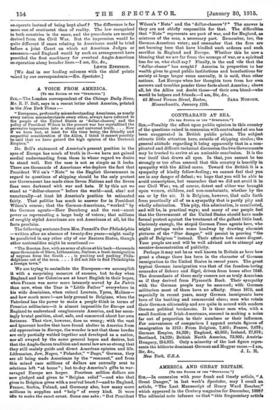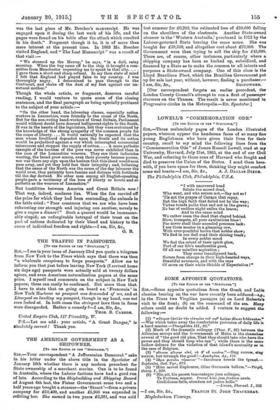AMERICA AND GREAT BRITAIN,
(To nu Norma or run .Sreor.won.")
Sue,—In connexion with your frank and timely article, "A Great Danger," in last week's Spectator, may I recall an article, "The Last Manuscript of Henry Ward Beecher," which appeared in the Century magazine for December. 1888P The editorial note informs us that "this fragmentary article was the last piece of Mr. Beecher's manuscript. He wee engaged upon it during the last week of his life, and the pages were found on his table after the attack which resulted in his death." Fragment though it be, it is of more than mere interest at the present time. In 1863 Mr. Beecher visited England, and " The Last Manuscript " was a result of that visit :— " We steamed up the Mersey." he says, "in a dull, rainy morning. When the tug came off to the chip it brought a com- mittee from Manchester requesting me to speak in that city. . . . I gave them a short and sharp refusal. In my then state of mind
I felt that England bad played false to my country. I was thoroughly angry. I determined to pass through to the Continent, and shake off the dust of my feet against our un- natural mother."
Though the whole article, or fragment, deserves careful reading, I would venture to quote some of the closing sentences, and the final paragraph as being specially pertinent to the subject of your article :—
"On the other hand, the labouring classes, especially cotton workers in Lancashire, were friendly to the cause of the North. But for the non-voting hand-workers of Great Britain, Parliament would without doubt have decreed belligerentrights to the Sonth. It was in the hearts of the legislators, but they were restrained by the knowledge of the strong sympathy of the common people for the cause of liberty.... It would naturally be expected that the men whose livelihood depended upon the South and its cotton would be prejudiced against a war which interrupted commercial intercourse and stopped the supply of cotton.... A. more pathetic example of the heroism of the poor was never exhibited than in the case of the Lancashire weavers. They saw their industries wasting, the bread grew scarce, even their poverty became poorer, nor was there any Opt upon the horizon that this cloud would soon pass away, and yet they held fast their integrity; and, believing that the cause of the North was the cause of the day labourer the world over, they patiently bore famine and distress with fortitude till the day dawned. No other men among all English-speaking people gave a testimony of the love of liberty so heroic and so pathetic as the weavers of Lancashire."
But hostilities between America and Great Britain now ! That way, indeed, madness lies. When the fox carried off the prize for which they had been contending, the animals in the fable cried "Poor creatures that we are who have been exhausting our strength and injuring one another, merely to give a rogue a dinner !" Such a quarrel would be immeasur- ably stupid; an unforgivable betrayal of their trust on the part of nations dedicated by their blood and history to the cause of individual freedom and rights.-1 am, Sir, dcc., G. B.



















































 Previous page
Previous page